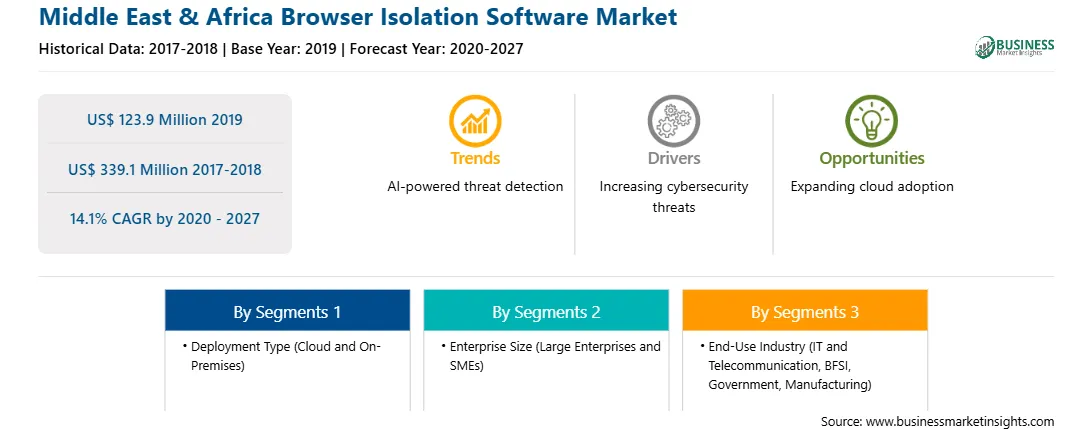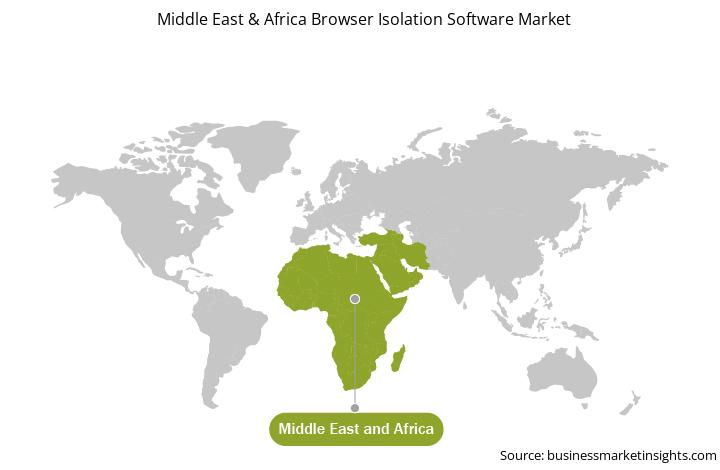Middle East & Africa Browser Isolation Software Market
No. of Pages: 102 | Report Code: TIPRE00015434 | Category: Technology, Media and Telecommunications
No. of Pages: 102 | Report Code: TIPRE00015434 | Category: Technology, Media and Telecommunications
Browser isolation is a technology that incorporates web browsing activity inside a confined environment, such as a sandbox or virtual machine for guarding computers and other accessories from various malware that the user might face. This privacy may happen remotely on a server or locally on the computer. Browser isolation technology proposes malware security for regular browsing by destroying malware to attain access to the end user’s device. MEA region is also constantly being targeted by cybercriminals, due to the constant growth in digital transformation as well as a rising source of vulnerability from mounting IoT connectivity. The growing cyber threat in the MEA region is also majorly due to the lack of transparency, results in feeble cyber enforcements and regulations. Constant technological transformations, heinous and malicious practices result in data loss and hinder the revenue generation for various organizations. Thus, to protect such incidences, the companies are progressively opting for browser isolation software. The MEA browser isolation software market is driven by increasing concern among the industry players related to the new forms of cyber threats, which include ransomware/micro ransomware and malware. Also, the declining cost of browser isolation software is a major factor for driving the market in MEA.
Furthermore, COVID-19 is causing drastic impact across the MEA region. Among the MEA countries, South Africa has faced the highest number of COVID-19 confirmed cases. Other major countries that are facing the economic impact of COVID-19 include Iran, Turkey, Saudi Arabia, the UAE, Egypt, Morocco, and Kuwait. The region comprises many growing economies such as the UAE, which are prospective markets for browser isolation providers, owing to the huge presence of diverse customer base for the IT & Telecom and BFSI industry. The COVID-19 pandemic would have significant effects on economies, but the MEA has negatively impacted as there is already pressure on the economy of various oil-based countries due to falling oil prices. Additionally, the factory lockdowns, business shutdowns, and travel bans are further aggravating the economic problems of the countries in the MEA region. Hence, the estimated decline in MEA’s economic condition and impact of COVID-19 on the growth of various industries in the region is expected to negatively impact the growth of the browser isolation software market in 2020 and 2021. However the browser isolation software market will experience steep rise from 2022 onwards.

Strategic insights for the Middle East & Africa Browser Isolation Software provides data-driven analysis of the industry landscape, including current trends, key players, and regional nuances. These insights offer actionable recommendations, enabling readers to differentiate themselves from competitors by identifying untapped segments or developing unique value propositions. Leveraging data analytics, these insights help industry players anticipate the market shifts, whether investors, manufacturers, or other stakeholders. A future-oriented perspective is essential, helping stakeholders anticipate market shifts and position themselves for long-term success in this dynamic region. Ultimately, effective strategic insights empower readers to make informed decisions that drive profitability and achieve their business objectives within the market.

| Report Attribute | Details |
|---|---|
| Market size in 2019 | US$ 123.9 Million |
| Market Size by 2027 | US$ 339.1 Million |
| Global CAGR (2020 - 2027) | 14.1% |
| Historical Data | 2017-2018 |
| Forecast period | 2020-2027 |
| Segments Covered |
By Deployment Type
|
| Regions and Countries Covered | Middle East and Africa
|
| Market leaders and key company profiles |
The geographic scope of the Middle East & Africa Browser Isolation Software refers to the specific areas in which a business operates and competes. Understanding local distinctions, such as diverse consumer preferences (e.g., demand for specific plug types or battery backup durations), varying economic conditions, and regulatory environments, is crucial for tailoring strategies to specific markets. Businesses can expand their reach by identifying underserved areas or adapting their offerings to meet local demands. A clear market focus allows for more effective resource allocation, targeted marketing campaigns, and better positioning against local competitors, ultimately driving growth in those targeted areas.

The browser isolation software market in MEA is expected to grow from US$ 123.9 million in 2019 to US$ 339.1 million by 2027; it is estimated to grow at a CAGR of 14.1% from 2020 to 2027. The requirement for browser security solutions is increasing at a visible pace throughout industries. Large organizations are heavily insisting on the acceptance of such technologies to guard the data and information on several channels. In order to aid the buyers, the market professionals are either colluding with well-established and industry-recognized software developers or administering procurement activities. The partnerships and acquisition activities are empowering the organizations to achieve customer support by proposing sound technologies. The MEA browser isolation software market is anticipated to expand over the projection period due to an increase in the need for such software and the software's availability through industry-recognized and reliable software developers.
In terms of deployment type, the cloud segment accounted for the largest share of the MEA browser isolation software market in 2019. In terms of enterprise size, the large enterprises segment held a larger market share of the MEA browser isolation software market in 2019. Further, the BFSI segment held a larger share of the browser isolation software market based on end user industry in 2019.
A few major primary and secondary sources referred to for preparing this report on the browser isolation software market in MEA are company websites, annual reports, financial reports, national government documents, and statistical database, among others. Major companies listed in the report are Bitdefender; Broadcom, Inc.; Citrix Systems, Inc.; Ericom Software.; Menlo Security, Inc.
The Middle East & Africa Browser Isolation Software Market is valued at US$ 123.9 Million in 2019, it is projected to reach US$ 339.1 Million by 2027.
As per our report Middle East & Africa Browser Isolation Software Market, the market size is valued at US$ 123.9 Million in 2019, projecting it to reach US$ 339.1 Million by 2027. This translates to a CAGR of approximately 14.1% during the forecast period.
The Middle East & Africa Browser Isolation Software Market report typically cover these key segments-
The historic period, base year, and forecast period can vary slightly depending on the specific market research report. However, for the Middle East & Africa Browser Isolation Software Market report:
The Middle East & Africa Browser Isolation Software Market is populated by several key players, each contributing to its growth and innovation. Some of the major players include:
The Middle East & Africa Browser Isolation Software Market report is valuable for diverse stakeholders, including:
Essentially, anyone involved in or considering involvement in the Middle East & Africa Browser Isolation Software Market value chain can benefit from the information contained in a comprehensive market report.